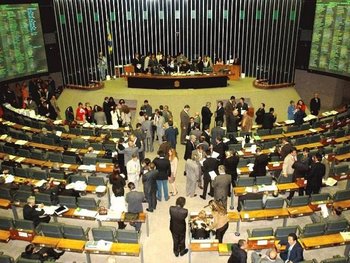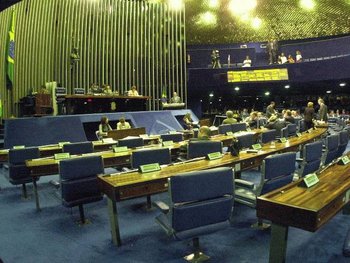Politics of Brazil
|
|
Brazil is a federal republic with 26 states and a federal district (see: States of Brazil). Template:Politics of Brazil
| Contents |
Government
The 1988 constitution grants broad powers to the federal government, made up of executive, legislative, and judicial branches. The president holds office for four years, with the right to re-election for an additional four-year term, and appoints his own cabinet. There are 81 senators, three for each state and the Federal District, and 513 deputies. Senate terms are for eight years, with election staggered so that two-thirds of the upper house is up for election at one time and one-third four years later. Chamber of Deputies terms are for four years, with elections based on a complex system of proportional representation by states. The seats are alloted proportionally to each state's population, but each state is eligible for a minimum of eight seats and a maximum of 70 seats. The result is a system weighted in favor of smaller states.
Fifteen political parties are represented in Congress. Since it is common for politicians to switch parties, the proportion of congressional seats held by particular parties changes regularly.
Brazilian political parties
States and municipalities
States are organized like the federal government, with three government branches. Because of the mandatory revenue allocation to states and municipalities provided for in the 1988 constitution, Brazilian governors and mayors have exercised considerable power since 1989.
Principal government officials
- President: Luiz Inácio Lula da Silva
- Vice-President: José Alencar Gomes da Silva
Country name
conventional long form:
Federative Republic of Brazil
conventional short form:
Brazil
local long form:
República Federativa do Brasil
local short form:
Brasil
Government type
Federative republic
Capital
Administrative divisions
26 states (estados; singular – estado) and 1 federal district* (distrito federal); Acre, Alagoas, Amapá, Amazonas, Bahia, Ceará, Distrito Federal*, Espírito Santo, Goiás, Maranhão, Mato Grosso, Mato Grosso do Sul, Minas Gerais, Pará, Paraíba, Paraná, Pernambuco, Piauí, Rio de Janeiro, Rio Grande do Norte, Rio Grande do Sul, Rondônia, Roraima, Santa Catarina, São Paulo, Sergipe, Tocantins
Independence
September 7 1822 (from Portugal)
National holiday
Independence Day, 7 September (1822)
Constitution
Brazil has had seven constitutions:
- Constitution of 1824 – the first Brazilian constitution, enacted by Dom Pedro I. It was monarchic, hereditary and highly centralized, permitting the vote only to property-holders.
- Constitution of 1891 – the republic was proclaimed in 1889, but a new constitution was not promulgated until 1891. This federalist, democratic constitution was heavily influenced by the U.S. model. However, women and illiterates were not permitted to vote.
- Constitution of 1934 – when Getúlio Vargas came to power in 1930, he canceled the 1891 constitution and did not permit a new one until 1934. The Constitutionalist Revolution of 1932 forced Vargas to enact a new democratic constitution that permitted women's suffrage. Getúlio Vargas was elected president by the Constitutional Assembly to a four-year term, beginning in 1933.
- Constitution of 1937 – Getúlio Vargas suppressed a Communist uprising in 1935 and used it as a pretext to establish autocratic rule. He instituted a corporatist constitution nicknamed the polish, written by Francisco Campos.
- Constitution of 1946 – after a military coup ousted dictatorial Getúlio Vargas, an Assembly wrote a democratic constitution.
- Constitution of 1967 – after the 1964 coup d'etât against João Goulart, the military dictactorship passed the Institutional Acts, a supraconstitutional law. This strongly undemocratic constitution simply incorporated these Acts.
- Constitution of 1988 – the progressive redemocratization culminated in the current constitution. Very democratic, it is more expansive than a normal constitution – many statutory acts in other countries are written into this constitution, like Social Security and taxes.
Legal system
Based on Roman codes; has not accepted compulsory ICJ jurisdiction.
Suffrage
Suffrage is voluntary between 16 and 18 years of age and over 70; compulsory over 18 and under 70 years of age (except for a few categories, such as illiterate and disabled people, for whom it is voluntary). President, state governors and mayors of state capitals and large cities are elected in two rounds (runoff voting): if no candidate obtains a majority, the first two candidates of the first turn go for a second one. Senators and mayors of smaller cities are elected in a single round (winner takes all). Deputies and city council members are elected by proportional elections with open party lists: the party candidates with the most individual votes take office.
Executive branch
Head of State:
Luiz Inácio Lula da Silva (since 1 January 2003); Vice President José Alencar Gomes da Silva (since 1 January 2003); note – the president is both the chief of state and head of government
Head of government:
Luiz Inácio Lula da Silva (since 1 January 2003); Vice President José Alencar Gomes da Silva (since 1 January 2003); note – the president is both the chief of state and head of government
cabinet:
Cabinet appointed by the president
Elections
President and vice president elected on the same ticket by popular vote for four-year terms; election last held October 2002 (next to be held October 2006).
Election results
Luiz Inácio Lula da Silva elected president; percent of vote – 61.2%
Legislative branch
Bicameral National Congress or Congresso Nacional consists of the Federal Senate or Senado Federal (81 seats; three members from each state or federal district elected according to the principle of majority to serve eight-year terms; one-third elected after a four year period, two-thirds elected after the next four-year period) and the Chamber of Deputies or Cámara dos Deputados (513 seats; deputies are elected by proportional representation to serve four-year terms)
Elections
Federal Senate – last held October 2002 for two-thirds of the Senate (next to be held October 2006 for one-third of the Senate); Chamber of Deputies – last held October 2002 (next to be held October 2006)
Election results
| Party | Number of deputies | Leader in the Chamber |
|---|---|---|
| Workers' Party | 91 | Paulo Rocha |
| Party of the Brazilian Democratic Movement | 86 | José Borba |
| Party of the Liberal Front | 62 | Rodrigo Maia |
| Progressive Party | 52 | José Janene |
| Liberal Party | 51 | Sandro Mabel |
| Party of the Brazilian Social Democracy | 51 | Alberto Goldman |
| Brazilian Labour Party | 48 | José Múcio Monteiro |
| Socialist People's Party | 17 | Dimas Ramalho |
| Brazilian Socialist Party | 16 | Renato Casagrande |
| Democratic Labour Party | 14 | Severiano Alves |
| Communist Party of Brazil | 9 | Renildo Calheiros |
| Green Party | 6 | Marcelo Ortiz |
| Party of the Reconstruction of the National Order | 2 | Enéas Carneiro |
| Social Christian Party | 2 | |
| No party | 6 |


